U.S. Suspends Aid To Syrian Rebels As Islamists Widen Influence
Syria’s Civil War has largely been off the radar hear in the United States, but that doesn’t mean it hasn’t been continuing. In the latest update to make the American media pay attention, though, it appears the U.S. has suspended aid to at least some Syrian rebel groups as it has become apparent that Islamist elements are seizing control of the rebellion:
BEIRUT — The U.S. government said Wednesday that it has suspended delivery of nonlethal aid to Syria’s rebels because an Islamist group has taken control of the warehouses where the supplies were stored, a seizure that exposed the rapidly shrinking authority of the moderate opposition factions backed by the United States and its Western allies.
The United States continues to supply humanitarian aid to Syrian civilians affected by the long-running conflict, and officials indicated that a covert program to provide small arms and ammunition to rebels in the southern part of the country was ongoing.
But the suspension of the supply of food, medical kits, trucks and communications equipment to rebels in the north illustrates the erosion of U.S. influence over the groups battling to topple Syrian President Bashar al-Assad. A growing number of rebel factions, disillusioned by the low level of Western support, have been aligning themselves with Islamist groups that receive more generous funding from Persian Gulf Arab states.
The recently created Islamic Front, which seized control of the warehouses, includes the biggest Islamist factions in Syria. The front’s expanding presence, and the fact that it is not affiliated with al-Qaeda, may leave the United States with little choice but to work with it, if Washington hopes to retain any influence over Syria’s opposition, analysts and rebel leaders say.
The cluster of warehouses, in the border town of Atmeh, was controlled by the opposition Free Syrian Army’s Supreme Military Council, which was tapped in June as the chief recipient of U.S. aid. More important than the relatively meager contents of the warehouses was the international legitimacy they conferred on the SMC and its leader, Gen. Salim Idriss, ahead of crucial peace talks due to begin in Geneva in January.
On Friday, the Islamic Front told fighters from the SMC that a group linked to al-Qaeda was preparing to attack the warehouses and that it could help defend the sites. Fighters from the Islamic Front then ejected the SMC rebels at gunpoint. It is unclear whether there really had been a threat of an attack, and some rebel factions have alleged that the Islamic Front’s warning was a ploy.
The warehouses contained food, including military ready-to-eat meals, medical kits, communications equipment and pickup trucks, typical of the items that the United States is supplying under a $16.9 million program, U.S. and rebel officials said. The buildings also contained sizable quantities of small-arms ammunition from an unknown source, according to an opposition figure close to the rebel fighters who spoke on the condition of anonymity because of the sensitivity of the subject.
“We’re obviously concerned” about the takeover of the warehouses, said Jen Psaki, a spokeswoman for the State Department. “We’re not prepared at this point to make a broad statement about what it means and what the long-term impact will be. We’re in close contact with the SMC. And we will see over the course of time what this means.”
The nonlethal assistance promised in the spring by the Obama administration has not made a significant difference in the rebels’ fighting capacity, which opposition leaders say may be one of the reasons that many fighters grew disillusioned with the SMC. Promised items such as body armor and night-vision goggles never materialized. Deliveries were disrupted by the takeover of territory along the northern border by the al-Qaeda-affiliated Islamic State of Iraq and Syria, which Washington has labeled a terrorist group.
If nothing else, I suppose this is a good argument for why we shouldn’t be providing arms to these people. At least non-lethal aid can’t be used to kill people.
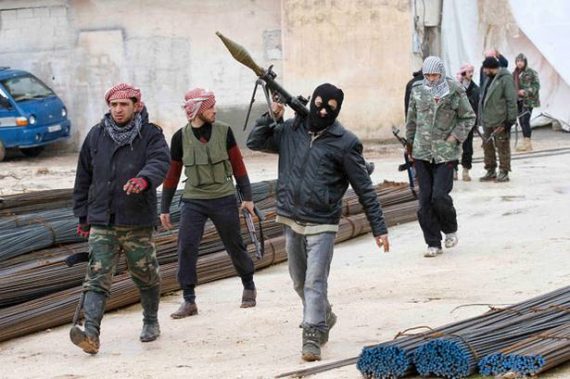

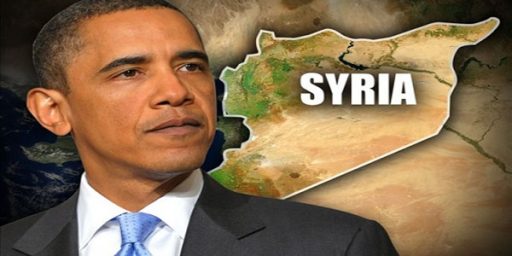
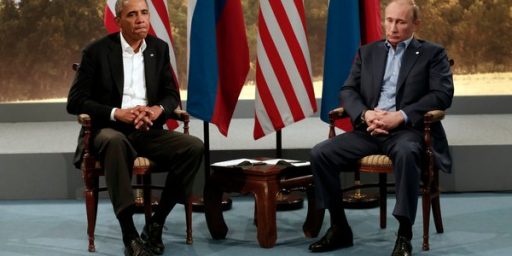
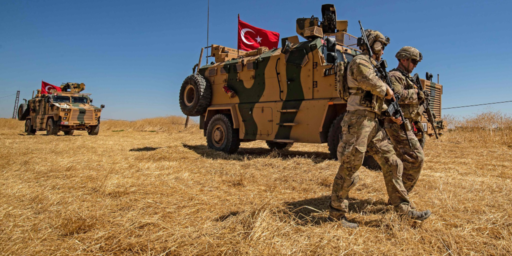
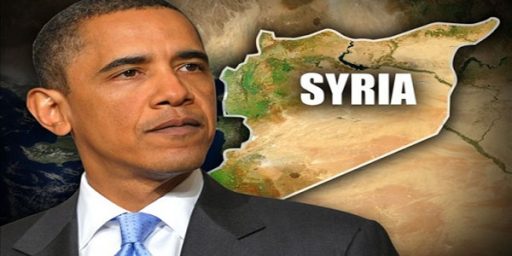
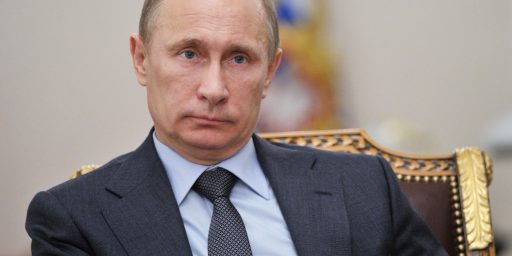
If only somebody could have predicted this.
Oh wait, somebody did.
Greetings:
Well, i think that as long as the folks over at our State Department are “obviously concerned” (they do obvious concern very, very well) things will work themselves out. Forward !!!
I hope someone made money. Jesus.
Is anybody else happy that, in general, this is Putin’s problem?
Doesn’t providing non-lethal aid still assist them in doing what they are doing? Give them food and equipment and they can then use their funds for weapons vs. food and equipment. Either way we are supporting these folks.
Two thoughts: First, that it would be an interesting counter-factual to consider what-might-have-been if we had cut off aid to the Afghan mujahideen at some much earlier place in that conflict. Could we still have a World Trade Center? And still have a fierce debate about Saddam Hussein?
And second, are not the Gulf Petro-Kingdoms somewhat within the range of American power? For pete’s sake, we have carried their water against Iraq twice and Iran constantly (and served our own purposes, too, of course). We should be stamping our feet and waving our arms red-faced in their government offices if we don’t want them sending money and arms to the Islamic Front.